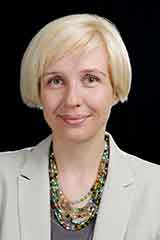United We Stand? Revisiting Community in North America
What does «community» mean in contemporary North America? With just a couple of days to go before the US-American presidential elections, an international conference organized by the Swiss Association for North American Studies (SANAS) underlined the pertinence of this question.
When the polls close this Tuesday night, a presidential election campaign will come to an end whose merging of the popular with the political seems unprecedented. Both candidates have fought to mobilize voters via various channels: the by now traditional TV debates, guest appearances on TV shows, and social media campaigns.

E pluribus unum – The American Melting Pot
Hillary Clinton’s and Donald Trump’s campaign staff have been wooing voters in both the analogue and digital worlds: cameras show fans holding up banners and placards, while elsewhere supporters are busy creating virally spread memes. Not only have political contents been staged with the help of manifold media; there is variety, too, where the different target groups of voters are concerned. These comprise communities defined by ethnic, religious, and cultural aspects or their sexual orientation – and they seem far more diverse than before. However, US-American society has always been characterized by diversity. «E pluribus unum» (out of many, one) is an important motto dating from the founding days of the United States. Initially referring to the challenge the young nation had to face – making one whole out of a heterogeneous bunch of colonies, thereby proclaiming political emancipation, this idea has permeated US-American literature and culture for several centuries now, reflected in uncountable examples.

Concepts, Representations and the Uses of «Community»
The biennial SANAS conference, organized by the English Department of the University of Bern (and generously funded by the Swiss Academy of Humanities and Social Sciences, SAHS, and the Intermediate Staff Association, MVUB), focused on the cultural dimension of the «e pluribus unum» motto. Its title, American Communities: Between the Popular and the Political, contained its core concerns in a nutshell: what role do notions of «community» play in North America, poised between politics and popular culture, and how are related issues such as exclusion, marginalization, exile, and resistance represented in literature, film and TV? What responses does cultural philosophy offer to debates on community and how can these notions be made useful for a better understanding of current political and social developments? More than 30 presenters from Switzerland, Germany, Great Britain, France, Poland, Canada and the United States provided a multitude of replies to these and other questions.

From «Gated Communities» to Homeland
The Western genre, for example, has served as a mirror of changing concepts of community, whereas «gated communities» are an exclusive form of communal life reserved for the generation 55+. Bioregionalism in Northern California reflects growing ecological awareness, while popular TV series such as Homeland spin gripping narratives out of the fear of terror that threatens to destabilize communities. Several of the presentations dealt with the Canadian situation, e.g., with how indigenous storytellers use digital media to enhance their narrative traditions and materials. The SANAS conference also hosted a panel together with the Swiss Philosophical Society (SPS). Dr. Christian Budnick and Dr. Jörg Löschke, both from the Philosophy Department at the University of Bern, provided valuable impulses from e.g., the discipline of ethics, where trust plays an important role in connection with community.
The two keynote speakers opened up the wider frames. Miranda Joseph, who is Professor of Gender & Women’s Studies at the University of Arizona, and Frank Kelleter, Einstein Professor for American Cultural History and Chair of the Department of Culture at the John F. Kennedy Institute of the Freie Universität Berlin. Miranda Joseph, author of an influential study tellingly entitled Against the Romance of Community (2002), continued her critique of conventional notions of community by discussing alternative models that steer away from heterosexual norms, for example. Frank Kelleter addressed the loops between serial formats of storytelling – omnipresent in popular culture – and capitalist consumerism.
Bringing together junior scholars and more established experts in their fields and taking place at a time when the world has its eyes firmly set on the US political scene, this conference opened up numerous avenues for further investigation.
About the Author

Julia Straub is a senior lecturer in Literatures in English/North American Literature and Culture at the English Department of the University of Bern. She studied at the Universities of Constance and York (UK) and spent time as a researcher at the Universities of Göttingen and Oxford. She completed her post-doctoral project («Habilitation») in 2013 with a study on a cultural memory discourse in early America. She is the editor of the Handbook of Transatlantic North American Studies (published in 2016 with DeGruyter).
Contact details:
PD Dr. Julia Straub
University of Bern
Department of English
Telefon direkt: +41 31 631 83 61
Telefon Institution: +41 31 631 82 45
Email: julia.straub@ens.unibe.ch
Department of English
The Department of English at the University of Berne is a community of scholars engaged in research and teaching in the fields of Modern and Historical Linguistics, Medieval Studies, Modern English Literature and Culture, North American Studies, Postcolonial Studies and Literary Theory.